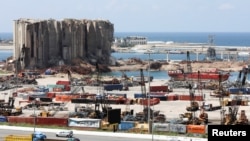Lebanon cannot pull itself out of its economic crisis without a new government to transform the country and launch long-stalled reforms, a senior official at the International Monetary Fund said.
The country defaulted on its debt last year, sending its currency crashing. Its economy shrank by 25% in 2020, the IMF said in a report last week.
A standoff over the make-up of a new government has intensified in recent months, delaying a revival of funding talks with the Washington-based crisis lender.
"The change of direction cannot be done on a piecemeal basis. It requires a comprehensive approach," the director of the IMF's Middle East and Central Asia Department, Jihad Azour, told Reuters.
Reforms should focus on the financial sector, public finance, governance, corruption and loss-making utilities that have contributed to a surge in debt, he said.
"In (the) absence of a new government that can lead this transformation, it's very difficult to expect that the situation will in itself improve," he added, joining a chorus of officials calling for an end to wrangling over the cabinet.
Lebanon's crisis started before the COVID-19 pandemic and accelerated after a huge stockpile of ammonium nitrate, stored unsafely for years, exploded in the capital’s port in August last year, killing 200 people.
International support through grants was needed, Azour said.
"Lebanon needs some large financing in order to jumpstart the economy again in order also to allow Lebanon to be on a recovery path that will take time but is highly needed."
Lebanon needed to rebuild confidence among citizens, investors and the international community," he added.
"This reform package is the starting point. And for that you need to have a new government who will lead the implementation of this reform program."





